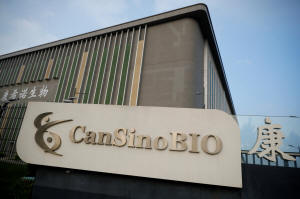CanSino's inhaled COVID-19 vaccine gets emergency use approval in China
 Send a link to a friend
Send a link to a friend
 [September 06, 2022]
HONG KONG (Reuters) -China's CanSino
Biologics Inc said on Sunday that its recently developed COVID-19
vaccine has been approved by the country's drug regulator for emergency
use as a booster, potentially benefiting its business. [September 06, 2022]
HONG KONG (Reuters) -China's CanSino
Biologics Inc said on Sunday that its recently developed COVID-19
vaccine has been approved by the country's drug regulator for emergency
use as a booster, potentially benefiting its business.
The inhaled version of Cansino's adenovirus-vectored COVID-19 vaccine
has obtained the green light from the National Medical Products
Administration, the company said in a filing on Sunday.
"The approval will have a positive impact on the company's performance
if the vaccine is subsequently purchased and used by relevant government
agencies," CanSino said.
The company cautioned, however, that it will face fierce competition
from other vaccines in China that have also obtained government approval
or are in clinical trials.
China granted emergency use authorisation to Livzon Pharmaceutical Group
Inc's COVID-19 vaccine as a booster, Livzon said on Friday, one of just
two new products against the disease the country had cleared in more
than a year.

[to top of second column]
|

A logo of China's vaccine specialist
CanSino Biologics Inc is pictured on the company's headquarters in
Tianjin, following an outbreak of the coronavirus disease
(COVID-19), China August 17, 2020. REUTERS/Thomas Peter//File Photo
 Cansino also said it was uncertain
when its vaccine would be able to go to market, since additional
administrative approvals are still needed, while sales would depend
on the COVID-19 situation at home and abroad, as well as China's
vaccination rate.
China has seen a recent flare-up in COVID outbreaks. The southern
tech hub of Shenzhen imposed a weekend lockdown in most parts of the
city on Saturday, while the southwestern metropolis of Chengdu put
its 21 million people under lockdown on Thursday.
Mainland China reported 1,848 new coronavirus cases for Sept. 3,
including both symptomatic and asymptomatic infections, compared
with 1,988 new cases a day earlier.
(Reporting by Twinnie Siu in HONG KONG and Samuel Shen in SHANGHAI;
Editing by Edmund Klamann)
[© 2022 Thomson Reuters. All rights
reserved.]
This material may not be published,
broadcast, rewritten or redistributed.
Thompson Reuters is solely responsible for this content. |